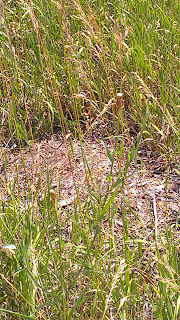Green burials the natural extension of home funerals
One grave holds the
cremated remains of a soldier killed in Afghanistan. Another, the remains of
the body of a stillborn baby. And another, the body of a mother, a painter, and
a community pillar.
These were, then, people
just like people in any cemetery.
But the graves and the cemeteries
are different. They are hidden among in the rolling and untamed hills, a plot
here, another over there. You could find them with a GPS, that’s how they’re
plotted. But left to your eyes alone, you would likely imagine that you’re
simply hiking in a pristine and lovely wood.
A tangled old burr oak stands
with arms spread wide over the child’s section; there is no hint that there are
bodies buried here. There are no grave markers, no neat rows, no mowed lawn, and
no flower arrangements. Here, there are just the trees, the forest undergrowth,
the paths, the plentiful monarch butterflies, and the birdsong of the woods.
 |
| This is one of two giant burr oaks that frame one section at the Natural Path Cemetery. |
This weekend, I went with
a group of my colleagues on a tour of two green cemeteries around the Madison,
Wisconsin, area. My colleagues and I form the Threshold Care Circle, a group of
educators and guides for home funerals and green burials.
We were touring these
green cemeteries so that we can gather information to begin the work of
creating a green cemetery here where I live, about two hours north of Madison.
A green cemetery is
dedicated to keeping a piece of land in as natural a state as possible while
allowing people to bury their loved ones. The requirements vary from cemetery
to cemetery, but generally this means no embalming, no elaborate caskets, no
concrete grave liners. Some green cemeteries don’t allow markers, some do.
 |
| The path to the rock circle at Circle Cemetery in Barneveld, WI. |
We visited two Wisconsin green cemeteries: Circle Cemetery, in Barneveld, and Natural Path Sanctuary in Verona. They each have a beautiful piece of land where people can bury their loved ones in this simple way. The number of green cemeteries is growing throughout the country as more people begin to understand that they have choices.
 |
| Circle Cemetery, in Barneveld, WI, has a rock circle that is made of rocks people have brought from all over the world. |
Our group, the TCC,
exists to help people plan and realize their options when it comes to thinking
about end of life, post-death care of the body, and burial.
Most people today rely
exclusively on others to take care of preparations for their loved ones: someone
else pronounces him dead, someone else washes the body, someone else dresses the
body, someone else lays him out, and someone else buries him.
 |
| New growth is the only hint of burial sites at the Natural Path Cemetery in Verona, WI. |
And there are a lot of
things in a “typical” funeral and burial these days that simply aren’t required
or really necessary. Embalming isn’t legally required or almost ever necessary.
A casket isn’t necessary, a concrete grave liner isn’t necessary.
Many people in these green
cemeteries were simply buried in a shroud, or, in the case of the baby, wrapped
in a blanket, placed in a handmade basket, and lowered into the ground. The
family and friends stood in the woods and helped to fill the grave, singing,
crying, and saying their goodbyes in meaningful ways.
 | |
| Some green cemeteries allow markers. This is nestled between two trees at the Circle Cemetery. |
It’s easy, walking through
the woods with a bunch of like-minded people, to marvel at the simple plots
where the land has already begun to reclaim the area and to appreciate the
beauty and simplicity of this approach. Families who take this approach tend to
feel more involved and useful. For people who have lived their entire lives
being conscious of the environment, this option feels right.
In those places, as a
bluebird flitted from one tree to another near us, it’s easy to forget how
threatening and scary and just plain weird the ideas of home funerals and green
burials are for some people. So part of our work is to help people understand
that this is the way that we buried our dead for so long. We took care of the
people we loved. We prepared their bodies, washed them, dressed them, and laid
them out. We buried them with the help of our loved ones and our communities.
This way is still a valid
way. Of course, there are those who would prefer to have someone else handle
the preparations.
 |
| A child's grave blends into the natural setting at Natural Path Cemetery in Verona, WI. |
But everyone I know who
has been involved in the actual work of caring for their dead or being involved
in the burial in some way has found the work incredibly rewarding. We don’t
have to hand off one of the most important things that we’ll do in life to
strangers. We can learn to do this work. With planning and help, this kind of
involvement and care of our loved ones can help us say goodbye with honor,
care, and love.
You can find out more
about the Threshold Care Circle at www.thresholdcarecircle.org,
Natural Path Sanctuary at www.naturalpathsanctuary.org,
and Circle Cemetery at www.circlesanctuary.org/cemetery.




 Tending the Fire Within
Tending the Fire Within
0 Comments:
Post a Comment
Subscribe to Post Comments [Atom]
<< Home